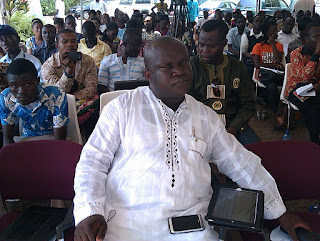The Ghana Journalists Association (GJA), October 21, 2011, launched a Social Media website
For the benefit of those colleague international journalists who are yet to visit Ghana, Ghana’s International Press Centre is strategically located adjacent to the premier communication training school in Africa, the Ghana Institute of Journalism (GIJ) nested in the greenery foliage opposite the British High Commission in the heart of Accra.
Mr. Ransford Tetteh, President of GJA, who performed the launching ceremony, encouraged Ghanaian media practitioners, both ancient and modern, popularly referred to as traditional journalists or online journalists, to embrace the social media in vogue, which is the future of the noble profession. “Whether we like it or not, the social media has come to stay. We have no choice but to embrace it,” he stressed.
The GJA President took the opportunity to advise about 80 trainee journalists present, who were purposely selected from various communication training institutions in the country to take advantage of available technologies to learn more about the social media such as tweeter , face book, flikr, YouTube, blogging etc , while in school.
The occasion itself was the 10 the anniversary celebration of the coming into being of the PenPlusBytes International Institute of ICT Journalism under the initiative of Mr. Kwame Ahiabenu II.
The event brought together some top-notch industry players and veteran journalists to share their loaded experiences with up and coming journalists who are to take over the mantle of journalism practice with all the information and communication technology at their command.
For example, Dr. Kwabena Riserson, Research Scientist and Information Management Programme of the Institute of Industrial Research (CSIR) delivered the keynote address and reminded participants that development will be a mirage without science and technology.
Mr. Kenneth Ashigbey, CEO of Joy FM and MD- in-waiting of the Graphic Communications Group was in the chair for the programme. He told trainee journalists that the media landscape is fast changing where the multimedia convergence is the order of the day.
Mr. Mawutodzi K. Abissath, Deputy Director and Head of ICT at the Information Services Department (ISD) of Ministry of Information, was present to enlighten student journalists about the functions of the Government of Ghana Portal (GoG Portal) www.ghana.gov.gh .
Mr. Abissath told young journalists that the GoG Portal is the official website of the Republic of Ghana where authentic and accurate information about Ghana ranging from Presidential State of Nation Addresses, Annual Budget Statements of Ministry of Finance, Parliamentary Bills and Acts, Profile of Ministers of states, Speeches and Policy Documents can be obtained free of charge.
He said the GoG Portal is “one-stop-non-stop- information shop” on Ghana ; adding that it is the electronic gateway to Ghana where investors go to access relevant and reliable information about Ghana before they emplane to land in the land of hospital people of Ghana. ’It is the website for researchers, journalists, educators, and students undertaking project works,’ he noted.
Other experts who did presentations at the workshop included representatives of Myjoyonline, on the topic: Revenue models for onlinenews; Citifmonline, Edge cube, Ghanaweb,all of spoke on the theme: Online News Publishing and Online tools for gathering news - Dot house.
Other important topics discussed were Modern trends in broadcast technologies by a representative from Viasat1; Mobile Journalism - SMSGH,Mobile Centent;and Mr. Daniel Maafo C.T.O of BulksSMS.
The workshop ended with a Keynote address on Social media and journalism- ENHANCING YOUR FUTURE AS A JOURNALIST THROUGH ONLINE JOURNALISM. This was delivered via Video Conference technique by the Director of the MIT Centre for Civic Media, USA. The event was described by one student trainee as "an eye opener experience".
The Communication Training Institutions whose students participated in the programme were the Ghana Institution of Journalism, the School of Communication Studies, University of Ghana, Legon, the Winner University of Education, the Africa University College of Communication and the Jayee University College.
M.K.Abissath, reporting from the GJA Headquarters in Accra
PENPLUSBYTES 10TH ANNIVERSARY BOOT-CAMP IN PICTURES
(c) All photographs published here were taken by the writer and blogger Mawutodzi K.Abissath































